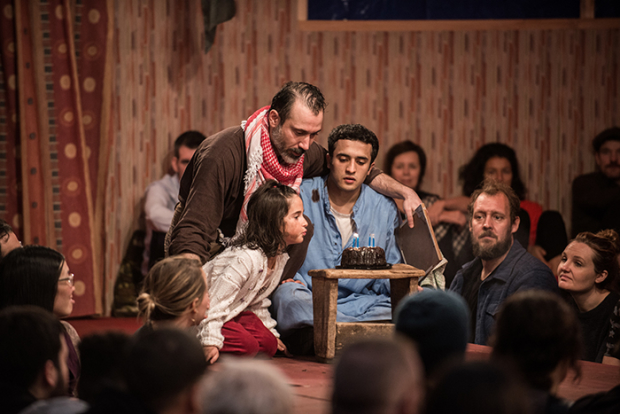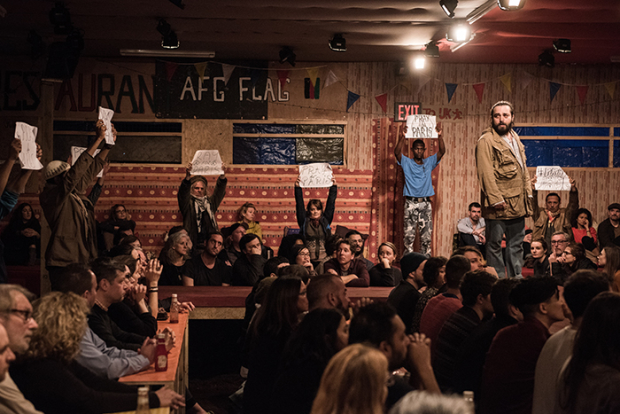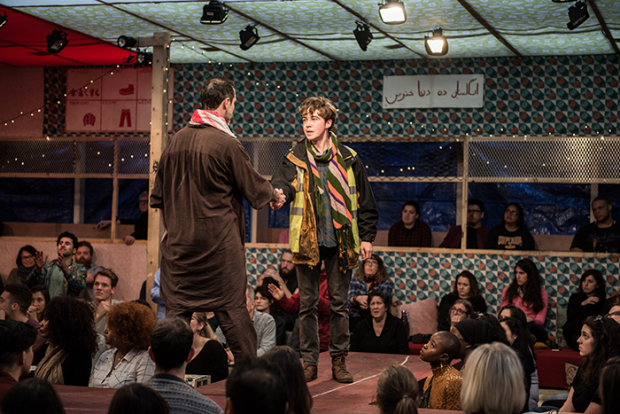The Jungle Gives Names and Joyful Music to Residents of a Bulldozed Refugee Camp
St. Ann’s Warehouse rebuilds the Calais compound in the heart of Brooklyn.

(© Teddy Wolff)
The Jungle, an emotionally jarring production that has been transplanted from London's Young Vic to St. Ann's Warehouse, vibrates with truth through every flattering and unflattering circumstance surrounding a momentary epicenter of Europe's refugee crisis. Led by directors Stephen Daldry and Justin Martin, the piece is more an experience than a play, physically and psychologically rebuilding a slice of life to ultra-realistic effect in the middle of Dumbo, Brooklyn.
Even in a place like the Calais Jungle — the cobbled together refugee camp that stood in the French port city from January 2015 until October 2016 when it was bulldozed to the ground — human nature proves unflappable. A shared purpose to seek asylum in the UK doesn't preclude the residents' impulse to carve out sections of the camp like national borders, separating the populations and ideologies of Afghanistan, Sudan, Eritrea, Iraq, and Iran (don't even try ironing out the politics of Kurdistan). You'll find yourself residing in one of these specified "countries," though the rows of tables adorned with half-empty ketchup bottles imply we're also sitting down for a communal meal in the Afghan restaurant that unites the people of the Jungle. Ben Turner carries a commanding presence as Salar, who runs the restaurant, is the de facto leader of the Afghan populace, and becomes a father figure to 15-year-old Norullah, played to impish perfection by Mohammad Amiri.
Miriam Buether crafts the production's immersive set design, including an opportunity to walk into the playing area through the dome that the show's authors, Joe Murphy and Joe Robertson, used as their space for the original Good Chance Theatre, which they created for the residents of the real Calais Jungle in 2015. That neatly brings us to the story's British representatives: the volunteers from the UK who enter the Jungle (and are responsible for translating its name from the Pashto word "Zhangal"), and tote their own traumas (or sins) to wash away with altruistic labor (costume designer Catherine Kodicek distinguishes their seasonal Western clothing from the Jungle residents' hodgepodge wardrobes that mix culturally distinct pieces with Western items that came from a donation pile).

(© Teddy Wolff)
A wealthy teenager named Sam (Alex Lawther) floats in with an iPhone and a first-world desire to "bear witness"; Derek (Dominic Rowan) believes political organization is the key to surviving a bitter winter; a comical drunkard name Boxer (Trevor Fox) bides his time at the camp to escape his ex-wife; Paula (Jo McInnes) is clearly fed up with the adults of the world and spends her days protecting unaccompanied children; and Beth (Rachel Reford), an 18-year-old lost soul, is confronted with unfiltered truth by the Sudanese teenager Okot (a stunning performance by John Pfumojena) as she struggles to find how her compassionate heart can best be put to use.
Herein lies the play's big question. Is the Jungle, or similar refugee camps, where compassionate hearts should be put to use? Or are people like Beth and Sam and our playwriting Joes suffering from that icky thing we call white savior complex? Or does that not matter if, at the end of the day, you've built 100 more housing units, or a school, or in the case of Murphy and Robertson, a place for community and creative expression (we get a taste of the goings-on inside the Good Chance dome with a blissful sequence of celebratory music and dance)? After all, if you do nothing but express your sympathies on the Internet, you'll be accused of "virtue signaling," as Beth notes in an extended monologue, lamenting today's paralyzing world where every emotion you share goes before the judge of authenticity.
Once you get beyond your rights of personal expression, there are so many more things to lament in a world that seems to be devoid of humanity, a world that places thousands of people in the purgatory of non-personhood with the labels of "migrant" or "refugee," a world that almost didn't allow three of The Jungle's performers to enter the United States because they hail from Iran and Syria. (Ammar Haj Ahmad, a Syrian refugee who expedited his British citizenship for the sake of this production, plays a narrator of sorts named Safi and delivers a performance that New Yorkers should feel privileged to have the opportunity to witness.)
To go back to the previously posed questions, The Jungle answers them all with "yes-and-no." If you leave with anything after the two hours and 45 minutes (other than an aching back from the bench seating), it's the feeling that no one person is only one thing. You can be caring and selfish, kind and prejudiced, somewhere and nowhere — all at once.

(© Teddy Wolff)







